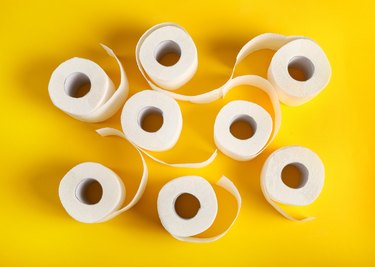
A lot of us are constantly on-the-go. But if, in your case, the phrase applies to your bathroom trips, you may be wondering what's going on with your body's plumbing.
Oftentimes a constant urge to pee can be due to guzzling too much water or being nervous, but it can sometimes signal a more serious medical problem, Oz Harmanli, MD, a urogynecologist at Yale Medicine, tells LIVESTRONG.com. At the very least, it can be annoying and even downright embarrassing.
Video of the Day
Video of the Day
So, How Many Times a Day Should You Pee?
It's likely more than you think. "Normal" frequency is considered up to eight times during the day when you're awake and once a night during sleep, Dr. Harmanli says.
If you drink more than 64 ounces of fluid (that's eight 8-ounce cups), you may go even more. Ditto during pregnancy, according to the Cleveland Clinic — especially in the third trimester as your bladder gets squished by your rapidly growing baby (and don't worry, this should resolve once you give birth).
If you pee fewer than four times a day, you may actually not be drinking enough fluids. This is especially true if your urine is a bright or dark yellow, which indicates dehydration.
If you go four to eight times a day, and your pee is light yellow to clear, it's a good indication that you're well hydrated and your bladder is operating like it should.
But if you're peeing much more than that, it can indicate that something's off with your plumbing, or that you might want to make some adjustments, says Dr. Harmanli. Below, we'll break it down.
4 Reasons You Have to Pee All the Time
1. You're Drinking Too Much Caffeine

Caffeine — found in coffee, tea and some soft drinks — is a diuretic, which means it can cause you to pee more. It can also up your urge to urinate.
"It's thought to stimulate your bladder's smooth muscle, and it may also irritate its tissues, which can cause it to involuntarily contract," Dr. Harmanli explains.
One February 2013 study in the International Journal of Urogynecology found that people assigned female at birth (AFAB) who drink more than 329 milligrams of caffeine a day (about three cups of coffee) are about 70 percent more likely to experience urinary incontinence than those who don't.
If you do drink a lot of java and notice you're running to the bathroom a lot, Dr. Harmanli recommends limiting yourself to less than 300 milligrams of caffeine a day.
Caffeine's not the only culprit, either. Alcohol (beer, wine or hard liquor) can also cause you to pee more, as can certain acidic fruits — think oranges, grapefruits, lemons and limes — and fruit juices, says Dr. Harmanli.
"I often have patients take a bladder diary, where they write down what they drink, how much and when they go to the bathroom," he says. "This can help them figure out what fluids may be behind their urge to go."
2. You Have a Urinary Tract Infection
More than half of all adults AFAB experience at least one of these nasties at some point in their life, according to a May 2019 paper in Therapeutic Advances in Urology.
These painful infections occur when bacteria invade your bladder. If you have one, you most likely feel like you gotta go all the time, even after you just peed, and you notice a burning sensation when you do.
While you might normally think of a UTI as something you get after sex, "we also see it a lot among post-menopausal women, because the lack of estrogen inside the vagina changes its flora and makes women more susceptible to infections," Dr. Harmanli explains.
If you think you have a UTI, call your doctor, who can have you come in for a urine culture and give you a course of antibiotics. But if you seem to get them a lot, there are things you can also do to help prevent them, Dr. Harmanli says.
If you use a spermicide with your birth control (say, a condom or a diaphragm), you may want to switch to another method, since spermicides seem to promote bladder infections in some people. Your doctor may also recommend that you drink more fluid, and pee right after sex, to flush out germs that might make their way into your bladder during intercourse.
If you're going through menopause, your doctor may prescribe vaginal estrogen, either as a cream or a flexible ring that you put in your vagina.
While some doctors recommend drinking cranberry juice or taking cranberry tablets, research supporting this approach is lacking. But if you do notice that your UTIs develop after sex, your doctor can prescribe a single low-dose antibiotic after intercourse as a preventative, notes Dr. Harmanli.
3. Your Pelvic Floor Muscles Are Weak

Your pelvic floor muscles hold up many of the organs in your urinary system, including your bladder. But if these muscles weaken — which happens when you give birth vaginally, as well as over time with regular aging — your organs can slip slightly out of place and lead to more frequent urination, says Benjamin Brucker, MD, urogynecologist and Director of Female Pelvic Medicine and Reconstructive Surgery at NYU Langone Health.
The best way to strengthen your pelvic floor muscles is to do — you guessed it — Kegel exercises, Dr. Brucker says. Squeeze your pelvic floor muscles — as if you're trying to stop your stream of urine — for three seconds. Relax for a count of three, then repeat several times. Try to do them three or four times a day.
If that doesn't help, you may want to consider a course of pelvic physical therapy, where you're taught specific exercises to strengthen your pelvic floor muscles (think of it like having your own "pelvic personal trainer").
If that doesn't work, then you're a candidate for surgery, where your doctor uses strips of synthetic mesh and your own tissue to create a sling from your bladder to where it connects with your urethra (bladder neck).
"It supports the urethra and helps keep it closed, so that you don't leak urine, especially when you cough or sneeze," Dr. Brucker says.
While it's very effective, this surgery isn't recommended until you've finished having kids, since pregnancy and childbirth can weaken those pelvic floor muscles once again.
Related Reading
4. You Have an Overactive Bladder
About 15 percent of people AFAB have overactive bladder, a condition where you have a frequent and sudden urge to pee, according to a March 2016 paper in Current Bladder Dysfunction Reports. While it can happen at any age, it's more likely to occur as you get older and go through menopause, as bladder tissue is more likely to get irritated thanks to a lack of estrogen, Dr. Brucker says.
If you feel uncontrollable urges that can even be triggered by behaviors such as unlocking the door when you come home, going out in the cold or turning on the faucet or washing your hands, it's likely that overactive bladder is the cause, according to UpToDate.
One of the first-line treatments is bladder training, which means going to the bathroom on a schedule while you are awake, Dr. Brucker says. You'll start by peeing at specific intervals during the day, starting with a short time interval between trips to the bathroom. If you have an urgent need to go before your scheduled time, you try to suppress the urge by doing Kegels. As your urine control gets better, increase the time between bathroom trips until you can safely go three to four hours without peeing.
If that's hard to achieve, then there are medications you can take to help reduce the urge, like tolterodine (Detrol) or solifenacin (Vesicare), notes Dr. Brucker. But these drugs have side effects like dry mouth and constipation. If you find them too annoying, you can try Botox, which has been shown to be as effective as drugs, he says.
Another option is a sacral nerve stimulator (SNS), a device about the size of a pacemaker that's surgically implanted into your butt and connected with wires to a nerve in your lower back. This sends electrical pulses to the nerve, which can help with feelings of urgency.
Related Reading
When to See a Doctor
If you've tried things like cutting back on fluids and caffeine, but you still notice that you're peeing a lot, see your doctor to rule out an underlying medical condition such as type 1 or type 2 diabetes that could be behind your urge to go.
Your doc will also check your urine for bacteria to rule out an undiagnosed UTI, and may also perform something called a post-void residual measurement, where you pee into a container and then your doctor checks the amount of leftover urine in your bladder via ultrasound. If you have a lot left, it may indicate an obstruction in your urinary tract, or a problem with bladder nerves or muscles, Dr. Brucker notes.
If your urge to pee is paired with pain, bloody or cloudy urine, back pain, fever, nausea or vaginal discharge, call your ob-gyn immediately. You want to make sure that you don't have an undiagnosed urinary infection, which, if untreated, can spread to your kidneys and cause permanent damage.
- Cleveland Clinic: "Frequent Urination"
- International Journal of Urogynecology: "Caffeine and Urinary Incontinence in US Women"
- Therapeutic Advances in Urology: "An introduction to the epidemiology and burden of urinary tract infections"
- UptoDate: "Urinary Tract Infections in Adolescents and Adults (Beyond the Basics)"
- UptoDate: "Patient Education Urinary Incontinence Treatments in Women (Beyond the Basics)"
- Current Bladder Dysfunction Reports: "The Burden of Overactive Bladder on US Public Health"
- UptoDate: "Patient Education Urinary Incontinence in Women (Beyond the Basics)"
Is this an emergency? If you are experiencing serious medical symptoms, please see the National Library of Medicine’s list of signs you need emergency medical attention or call 911.